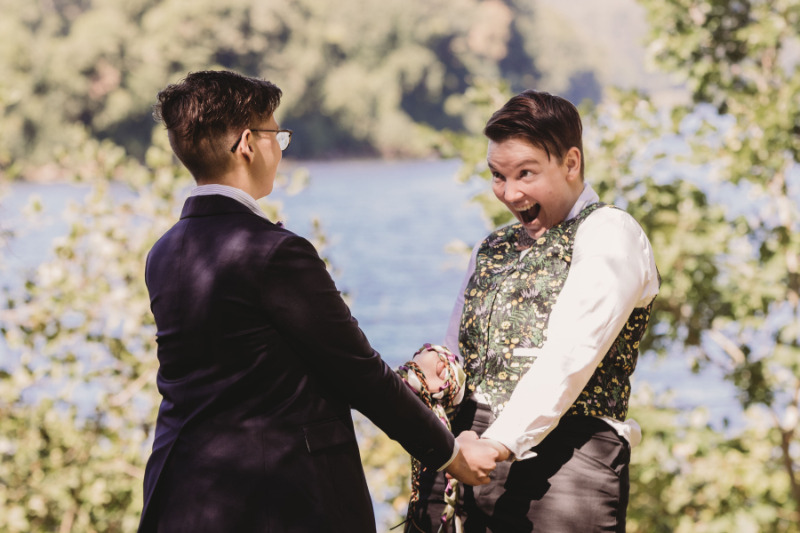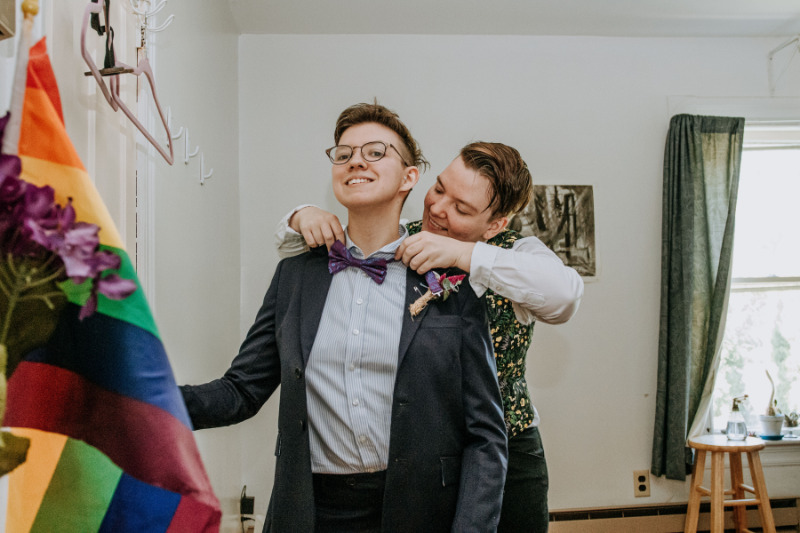
Between my wife and I, a total of four proposals were made before we got married this past September. The logistics varied: a drunken proposal that we “get married on an Irish cliffside somewhere,” an heirloom ring bestowed in a dorm room, a highly elaborate ruse involving a ring in a cupcake, and a Valentine's Day card containing a sketch of a ring that had yet to arrive from Etsy, complete with getting down on one knee to pop the question.
We kept proposing to each other because the circumstances that allowed actually planning a wedding kept evading us. Then, things finally began to stabilize enough that we could say, “We're really doing it this time!” and we booked our Grecian honeymoon just in time for COVID-19 to dash anyone's dreams of a wedding even vaguely resembling something you see on TLC.
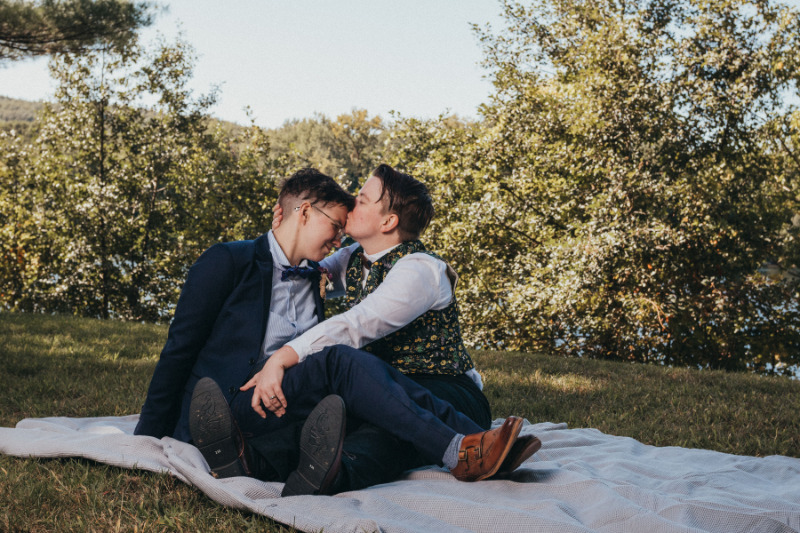
We knew from the start that our wedding wasn't going to be very much like the ones you see on TV
We were two butch lesbians, for one, so even the gay wedding media I so desperately sought out rarely depicted couples that looked like us. I am also physically disabled, so things like a wedding ceremony procession, or the many expected dances didn't make a lot of sense from the get-go.
Still weirder, having no family support while planning the event was especially hard for me because my mother was a destination wedding photographer while I was growing up. My engagement happened to coincide inconveniently with the time she needed to process my relatively recent coming out.
Because I grew up absorbing wedding stuff by osmosis, I had a lot of wants and expectations for the day, even if one of them wasn't a pure white dress or a father-daughter dance (my dad's great, it's just weird). By contrast, my wife grew up with a lot less pageantry attached to the weddings they witnessed, and a lot less tangential knowledge of what a wedding was “supposed to” be like.
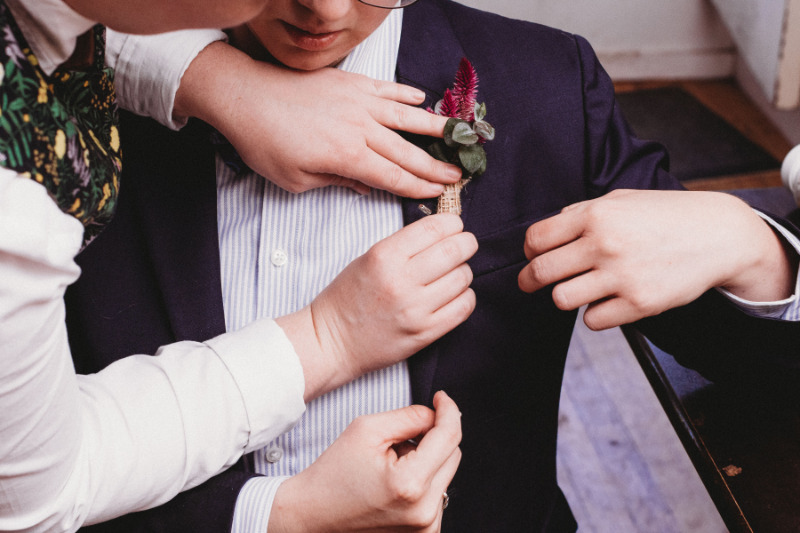
Despite being comfortably masculine-of-center, I felt obligated to occupy a much more “bridal” role when it came to planning; my fianceé literally didn't have a frame of reference for things I was losing sleep over.
After courting several caterers and multiple live musicians, and briefly, bravely, flirting with the idea of cooking our reception food ourselves, COVID hit, and then spread, and we decided to axe our reception altogether. We opted instead for a very casual, socially-distanced bonfire in our backyard. I ordered a dozen cupcakes, in three flavors, chosen on the spot, from a local vegan bakery, two weeks before the wedding.

We had previously booked our ceremony and reception space: a public green space with an open-air pavilion that could be booked for private events. Two months prior to our day, the agency managing the area regretfully informed us that COVID obligated them to refund any reservations at the pavilion.
We had no venue, until we realized that the space where we wanted to have our ceremony would remain open to the public: we were going to have a guerilla wedding. We ended up sharing the venue with at least four other couples who got married that same day, but I maintain that my insistence that we tie the knot before noon meant we got the best spot.
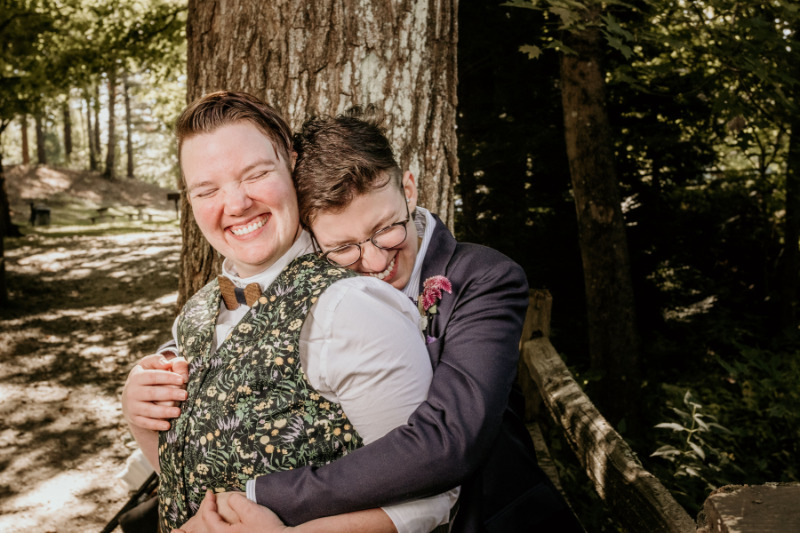
Planning our same sex wedding was an ongoing process — for me, one of radical acceptance
I realized through several tearful, late-night breakdowns that everything I had been agonizing over was something someone else had told me was important, or was motivated by not wanting to let someone else down. None of it really mattered, because weddings as I knew them weren't meant for people like us. This was the most freeing realization in the whole process, because it meant we could really, truly do whatever we wanted.
Since we had no monetary support while planning, there was no one to tell us we couldn't have the ceremony on the fly. No one to turn up their nose at our emailed invites. No one to help arrange the flowers we bought in bulk from a local farm, but no one to insist they were the wrong color, either.
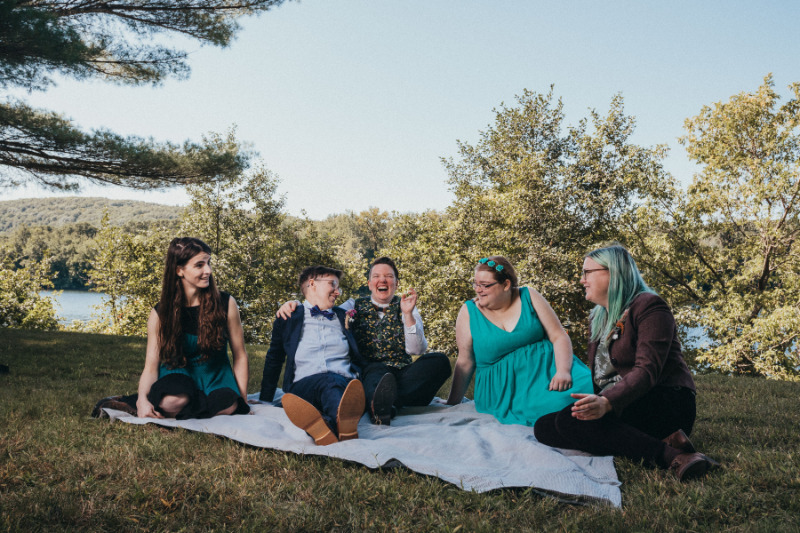
Our wedding party grew and shrank and rearranged itself like a reflection in a funhouse mirror. In the end, some siblings and best friends had to bow out, while others drove cross-country, got tested, and slept on couches. Nobody's outfit matched. I had no ceremony musicians booked now, and live music was something that I really wanted. A bridesmaid of mine who joined the party exceptionally late had no problem jumping in to play some fiddle tunes after the vows.

Our wedding pictures feature everyone in uncoordinated masks. Our audience of about 10 loved ones sat in camp chairs and on picnic blankets. Our largest expenditure was, in predictable fashion, our photographer, who partitioned our coverage package to include a separate couple's shoot after our brief Berkshire honeymoon (Greece would have to wait, but I got the airfare refunded, too!), to make up for the time they didn't spend shooting our reception.

All this is to say, COVID may have been the best thing that could have happened to our lgbtq wedding plans. It saved us boatloads of money we didn't really have, excused us from several heteronormative traditions, and taught me what really mattered about my wedding: my marriage, of course!
While there are things I'd change about how our wedding finally went down, none of them have anything to do with chafing dishes or seating charts or chair sashes. It was a stunning day, and at the end of it we were married, and no pandemic or political upheaval can take that day from us now.
